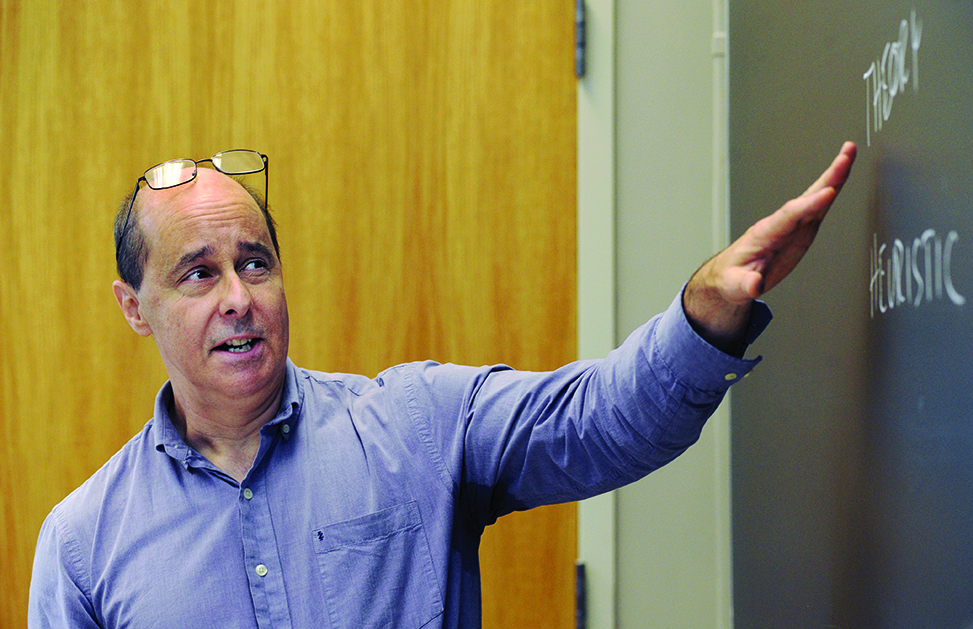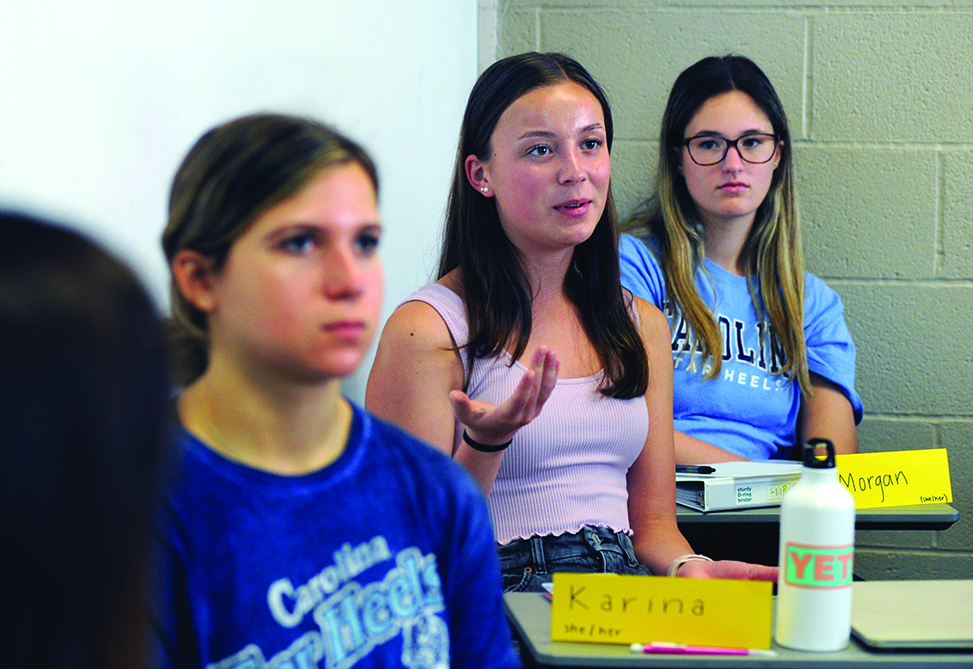
Andy Lang teaches a College Thriving class, which is designed to help first-year students learn to successfully navigate life at Carolina. (photo by Donn Young)
A new general education curriculum launched this fall at Carolina and is designed to support students as they engage in their communities and the world.
With the goal of ensuring that Carolina undergraduates gain the skills and knowledge needed to become lifelong learners, UNC launched a new undergraduate general education curriculum this fall. Known as IDEAs in Action, the curriculum is designed to be innovative, inclusive and global. Students will develop their own path while honing strategies needed to contribute to the world as engaged citizens, scholars, community members and leaders. They will also strengthen their abilities to think critically, work collaboratively and communicate persuasively.
All first-year and transfer students were introduced to the new curriculum as they signed up for their fall semester courses; upper-class students will finish their academic careers under the old curriculum.
A diverse group of faculty and other stakeholders worked for more than five years to develop and pilot several aspects of the new curriculum, which was approved by the Faculty Council in 2019. (The pandemic delayed the curriculum’s implementation). IDEA stands for identify, discover, evaluate and act — and it focuses on four main outcomes for students:
- Identify pressing questions, problems and issues
- Discover ideas, evidence and methods that inform these questions
- Evaluate these ideas, evidence and methods
- Act on the basis of these evaluations.
A key element of the curriculum is a more structured first-year experience, with a set of required courses. First Year Foundations is composed of five classes that students may take in either semester. Three of the five — First Year Seminar/First Year Launch, University Writing and a Global Language — existed in the prior curriculum. The new classes — Ideas, Information and Inquiry (known colloquially as Triple-I) and College Thriving — were piloted for a year or more in advance of the formal launch of IDEAs in Action.
“The literature indicates that it’s beneficial for students to have a shared and introductory experience in their first semester,” said Nick Siedentop, director of undergraduate curricula in the Office of Undergraduate Education. “Giving students the foundation for how to succeed as a college student — how to be resilient when they experience challenges during their academic career and how to explore UNC’s different programs and majors — offers them a great start.”
Marsha Dopheide, a teaching assistant professor in psychology and neuroscience, leads the new College Thriving initiative. She said College Thriving provides first-year students early exposure to a variety of tools to succeed not only on campus, but in their lives.
“The biggest goal is for students to develop meaningful connections on campus, create strategies for academic success and reflect on the ways that resilience and well-being will support their ability to reach their full potential both in and out of the classroom,” Dopheide said.
Students will encounter a broad array of academic ideas through classes that fulfill different “focus capacities.” These include: Aesthetic and Interpretive Analysis; Creative Expression, Practice and Production; Engagement with the Human Past; Ethical and Civic Values; Global Understanding and Engagement; Natural Scientific Investigation; Power, Difference and Inequality; Quantitative Reasoning and more.
Thriving in college — and in life

Justin Forbes ’25 said that it can be a tough transition from high school to college. After juggling many extracurricular activities while excelling academically in his Pennsylvania high school, he assumed that the same tactics he used in high school would work at UNC.
“College is different in many ways, especially as someone who came from a small high school where I knew all my teachers by name, and they knew me,” said the biomedical engineering major.
After completing one of the College Thriving pilot classes, Forbes said he believes this new addition to the curriculum is valuable in providing students ways to balance academics and extracurricular activities and prioritize mental health.
College Thriving is designed to empower students to participate fully in the opportunities of a major research university. Instructors hold weekly small group meetings with first-year students to provide a safe learning space to foster connections with peers, engage with varied campus resources, and enhance students’ skills to thrive at Carolina and beyond.
“When students learn effective strategies to cope with stress, practice self-compassion and self-care and make positive connections to others on campus, they will learn more effectively and be able to fully benefit from the opportunities available to them at a diverse liberal arts university,” said Erica Wise, an adjunct professor in psychology and neuroscience who helped develop the pilot.
Thrive Hubs provide opportunities for the Academic Advising office to partner with students “to consider how their unique undergraduate and co-curricular experiences fit in with the larger goal of creating a life with purpose and meaning,” Dopheide said.
Triple-I and data literacy
Triple-I courses are another required component of the new curriculum. The classes are team-taught by three professors from different disciplines, offering a range of perspectives on a topic. This fall, courses include “Gender,” “Fake News, Real Science,” “The Future of Food: Technology, Policy, and Culture,” and “What is Art? Where is Art?,” among others.
Each Triple-I class is paired with a one-credit data literacy lab. In that lab, students formulate research questions, learn how to organize a research paper, discuss ethical issues that arise and learn techniques to analyze and use data.
“The data literacy course prepares students to be savvy consumers and producers of data and information, which will serve them well whether they go to graduate school or pursue a career,” said Andy Lang, associate dean of information technology and data analytics, who developed this element of the new curriculum. Lang is also teaching a College Thriving class.
“Data science is no longer just a STEM or technology-related field,” said Arnav Gunwani ’25, who plans to major in business and was in one of the pilot data literacy sections last year. “Even fields like government, anthropology and other liberal arts subjects all use some form of data analysis now.”
“We’re trying to help students become critical consumers of the information that they are bombarded with,” added Caitlin Smith, faculty director of the data literacy component. “It’s vital to be able to critically examine information that supports a particular statement.”
Throughout their undergraduate years, students will reinforce the concepts they are learning in the classroom by immersing themselves in hands-on learning experiences. These include high-impact experiences such as mentored research, study abroad, service learning and internships.
“How is this new curriculum benefiting our students? We’ve asked ourselves that every day over the last few years, and we’ll continue to evaluate how well our intentions are actualized in students’ learning going forward,” said Abigail Panter, senior associate dean for undergraduate education. “We want all students to succeed — to be able to transition from high school to this large public research university and then to graduate study, a career and lifelong learning. We want to provide them with opportunities to practice the skills needed for life, such as producing high quality intellectual work, discovering, collaborating and communicating.
“Through IDEAs in Action, students will explore their passions, reflect regularly on their learning and integrate ideas in new ways to prepare them for life beyond Carolina.”
Learn more at ideasinaction.unc.edu.
By Michele Lynn
Published in the Fall 2022 issue | Features




